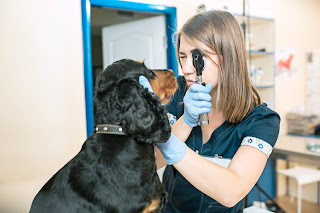How To Take Care Of A
Puppy Before Got Illness
Doggies are such a lot of tomfoolery; however, they
likewise require a great deal of work. Here are a little bit hints on the best
way to deal with a puppy.
The principal thing you want to do is start potty
preparation for your puppy. This can be a test, yet it's critical to begin
straightaway. Be predictable and patient, and utilize uplifting feedback when
your puppy progresses admirably.
One
more significant piece of dealing with a puppy is ensuring they are sound.
Watch for indications of disease, like looseness of the bowels, retching, or
laziness. Assuming that you notice anything wrong, take your puppy to the vet
immediately.
Take advantage of Your First Visit To The Vet.
During your first veterinary visit, we will play out an intensive physical and assemble data from you to assist with getting a total image of your puppy's wellbeing. This is likewise your chance to accumulate all of the significant puppy care data. You should be an educated, mindful and cherishing watchman to that puppy.
While the majority of these contemplations and proposals are no different for all doggies, our veterinarians will consider factors, for example, breed, age, your way of life, and any current wellbeing or conduct issues, to make suggestions that will be custom fitted to your puppy's necessities.
Quality Puppy Food Makes A Big Difference
Ensure
your puppy has new and bountiful water promptly in the day to help separate the
puppy food, as well as to keep them hydrated. Having normal taking care of and
strolling timetable will be enormous assistance with potty preparation. Young
doggies will start to learn, comprehend and partake in a planned daily
schedule.
Additionally,
make certain to follow an organized puppy taking care of the
timetable. Talk about this with one of our veterinarians at your next arrangement
and request customized guidance to guarantee you are taking care of your puppy
appropriately. continuously partake in your food.
It is ideal to stay with a decent puppy diet and follow taking care of the schedule. Start early preparation of the puppy on the best way to act while you are eating. This might include creating or requesting that the puppy stay outside of the lounge area/kitchen until it learns appropriate conduct.
Begin Puppy Potty Training With A Good Bathroom Routine
It
generally just takes a few times of cleaning puppy pee and poo for proprietors
to understand the significance of potty preparation. Puppy potty preparation
should start quickly after bringing your new canine buddy home. The simplest
arrangement for exceptionally youthful little dogs is to take them out a ton
(hourly for someplace you need them to proceed to compensation with quick
delicate commendation after they go to the restroom.
Carton
preparing is a method for restricting the puppy in a little region when it
isn't being observed with the goal that it doesn't soil the house or bite up
shoes. The case can be utilized altruistically when the proprietors know about
the appropriate activity prerequisites and have set up a timetable for eating
and going outside to assist with potty preparation. The carton can turn into a
lair for most canines and is incredibly helpful in the proprietor's capacity to
potty
train. See present on box preparing for a more careful clarification to
make carton preparing effective.
Puppy
potty preparation starts with knowing when you should accept your puppy outside
to do its business. The most widely recognized times to take your puppy out to
potty are:
· Whenever you awaken
(or the puppy awakens) Just before sleep time
·
Following your puppy
eats or beverages and again 20-30 minutes later At the point when your puppy
awakens from a rest
·
During and after
actual work
When
your puppy starts its inoculations, it is prepared to start puppy class with
other immunized little dogs. We suggest that you start puppy classes at 7 two
months and go on from puppy class to the following phase of essential
preparation.
Indications Of Illness In Puppies
Youthful young doggies are
powerless to sicknesses and illnesses that can be intense, the greater part of
which are very much preventable. To this end, puppy inoculations are so
significant.
Nonetheless,
puppy immunizations alone won't forestall all sicknesses. The way to
forestalling disease is being industrious in observing your puppy's conduct for
manifestations. Assuming that you notice any of the accompanying indications in
your puppy, contact your vet right away:
·
Absence of craving
·
Unfortunate weight gain
·
Regurgitating
·
Enlarged or
difficult midsection
· Laziness (sluggishness
·
Trouble relaxing
·
Failure to pass pee
or stool
These
side effects all demonstrate pressing or crisis circumstances and require
prompt veterinary consideration. Would it be a good idea for you to notice any
of these manifestations? If it's not too much trouble, call Indian Trail Animal
Hospital right away.
Plan Puppy Vaccinations
Puppy
inoculations should happen each 3-4 weeks until about four months old enough
during the initial while of life, and go on with promoter vaccinations all
through adulthood. There is the center and non-center puppy inoculations for
your puppy, and your veterinarian can assist you with concluding which puppy
immunizations are ideal for your canine buddy. An overall puppy immunizations
plan looks something like this:
6-7 weeks: DHPP, Bordetella
9-10
weeks: DHPP, Bordetella, Leptospirosis
12-13
weeks: DHPP, Leptospirosis, Canine Influenza, Lyme Disease 15-17 weeks: DHPP,
Rabies, Canine Influenza, Lyme Disease
At
long last, ensure you plan normal inoculations for your puppy. This is pivotal
for their wellbeing and will assist with shielding them from diseases. The time
you focus on this puppy at the start of its life will significantly affect your
relationship for the following 12-15 years.



Comments
Post a Comment